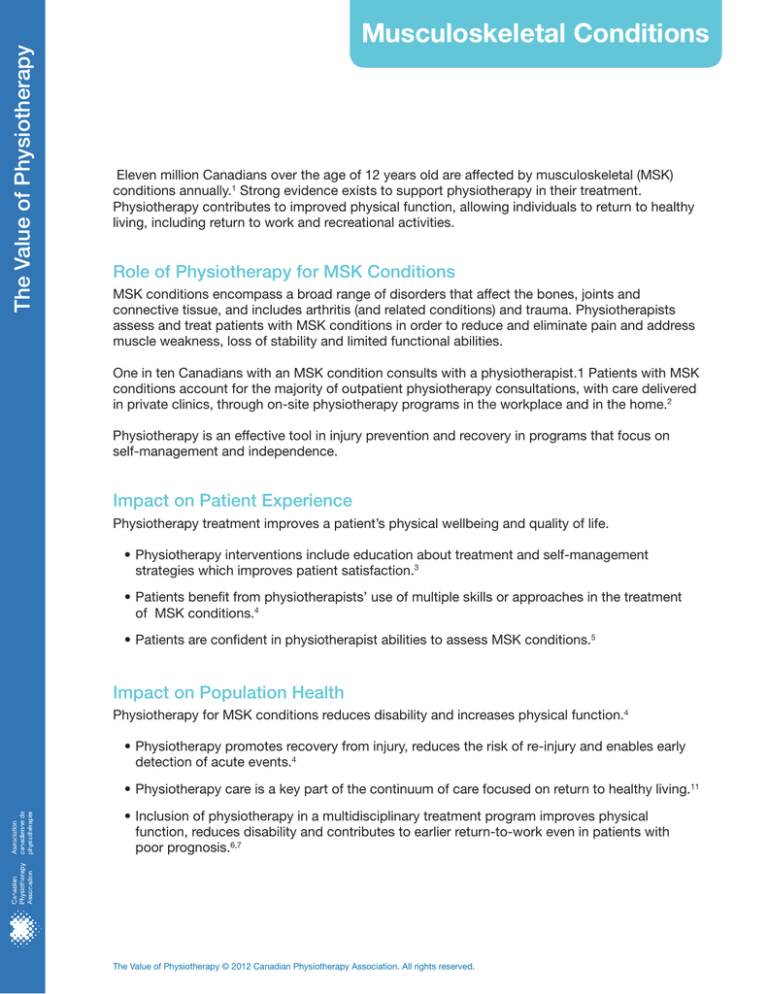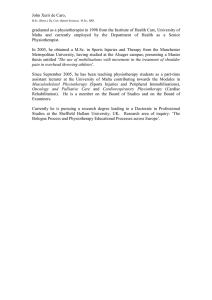
The Value of Physiotherapy
Musculoskeletal Conditions
Eleven million Canadians over the age of 12 years old are affected by musculoskeletal (MSK)
conditions annually.1 Strong evidence exists to support physiotherapy in their treatment.
Physiotherapy contributes to improved physical function, allowing individuals to return to healthy
living, including return to work and recreational activities.
Role of Physiotherapy for MSK Conditions
MSK conditions encompass a broad range of disorders that affect the bones, joints and
connective tissue, and includes arthritis (and related conditions) and trauma. Physiotherapists
assess and treat patients with MSK conditions in order to reduce and eliminate pain and address
muscle weakness, loss of stability and limited functional abilities.
One in ten Canadians with an MSK condition consults with a physiotherapist.1 Patients with MSK
conditions account for the majority of outpatient physiotherapy consultations, with care delivered
in private clinics, through on-site physiotherapy programs in the workplace and in the home.2
Physiotherapy is an effective tool in injury prevention and recovery in programs that focus on
self-management and independence.
Impact on Patient Experience
Physiotherapy treatment improves a patient’s physical wellbeing and quality of life.
•Physiotherapy interventions include education about treatment and self-management
strategies which improves patient satisfaction.3
•Patients benefit from physiotherapists’ use of multiple skills or approaches in the treatment
of MSK conditions.4
•Patients are confident in physiotherapist abilities to assess MSK conditions.5
Impact on Population Health
Physiotherapy for MSK conditions reduces disability and increases physical function.4
•Physiotherapy promotes recovery from injury, reduces the risk of re-injury and enables early
detection of acute events.4
•Physiotherapy care is a key part of the continuum of care focused on return to healthy living.11
•Inclusion of physiotherapy in a multidisciplinary treatment program improves physical
function, reduces disability and contributes to earlier return-to-work even in patients with
poor prognosis.6,7
The Value of Physiotherapy © 2012 Canadian Physiotherapy Association. All rights reserved.
The Value of Physiotherapy
Impact on Health Care Costs
Direct access to physiotherapy for patients with MSK injuries is safe, effective and a costeffective service delivery model.8
•There is evidence that physiotherapists’ advanced clinical knowledge in the treatment of
individuals with MSK conditions results in lower health care costs.8
•Physiotherapy can delay or decrease the need for surgical intervention through appropriate
conservative management, resulting in cost savings to the health care system.9
•On-site physiotherapy services provide early cost-effective management of MSK injuries,
reduces the number of workplace claims and the duration and costs of lost work time.10
Summary
Physiotherapy plays an integral role in the care and treatment of patients with MSK conditions.
Treatment for patients with MSK conditions promotes injury recovery and functional improvements, with a focus on self-management and independence. Physiotherapy for MSK conditions
is particularly effective for injury prevention and detection prior to the condition becoming
incapacitating for the patient.
Outpatient physiotherapy programs for patients with MSK conditions are cost-effective and result
in earlier return-to-work and return to pre-injury activities.
Key References:
1. Building a Collective Policy Agenda for Musculoskeletal Health and Mobility; Canadian Orthopaedic Care Strategy Group backgrounder report. 2010.
2. Carter, SK. and Rizzo, JA. Use of outpatient physical therapy services by people with musculoskeletal conditions. Physical Therapy. 2007; 87(5): 497-512.
3. Knight PK, Cheng AN, Lee GM. Results of a survey of client satisfaction with outpatient physiotherapy care. Physiotherapy Theory and Practice.
2010:26(5):297-307.
4. Valuation of Physiotherapy Services in Canada; CPA report using MCDA analysis for determining value of physiotherapy services; Mitton G;
Dionne F. 2012.
5. Ludvigsson ML, Enthoven P. Evaluation of physiotherapists as primary assessors of patients with musculoskeletal disorders seeking primary health
care. Physiotherapy. 2012; 98(2):131-7
6. Meijer EM, Sluiter JK, Heyma A, Sadiraj K, Frings-Dresen MHW. Cost-effectiveness of multidisciplinary treatment in sick listed patients with upper
extremity musculoskeletal disorders: a randomized, controlled trial with one-year follow-up. International Archives of Occupational and Environmental
Health. 2006;79(8):654-64.
7. Haldorsen EM, Grasdal AL, Skouen JS, Risa AE, Kronholm K, Ursin H. Is there a right treatment for a particular patient group? Comparison
of ordinary treatment, light multidisciplinary treatment, and extensive multidisciplinary treatment for long-term sick-listed employees with
musculoskeletal pain. Pain. 2002 Jan;95(1-2):49-63.
8. Childs JD, Whitman JM, Sizer PS, Pugia ML, Flynn TW, Delitto A. A description of physical therapists’ knowledge in managing musculoskeletal
conditions. BMC Musculoskeletal Disorders 2005, 6:32 9. Oldmeadow LB, Bedi HS, Burch HT, Smith JS, Leahy ES, Goldwasser M. Experienced physiotherapists as gatekeepers to hospital orthopaedic
outpatient care. Med J Aust. 2007; 186 (12): 625-628.
10. Sadi J, MacDermid JC, Chesworth B, Birmingham T. A 13-year cohort study of musculoskeletal disorders treated in an auto plant, on-site
physiotherapy clinic. J Occup Rehabil. 2007 Dec;17(4):610-22
11. Norr Norrefalk JR , Linder J, Norrefalk JR, LinderJ Ekholm J, Borg K. A 6-year follow-up study of 122 patients attending a multiprofessional
rehabilitation programme for persistent musculoskeletal-related pain. Int J Rehabil Res. 2007 Mar;30(1):9-18.
The value of a health care service is more than its proven cost-effectiveness.
Quality of life, access, and continuity of care and integration of services are
equally important criteria when looking at the broader concept of value.
The Value of Physiotherapy © 2012 Canadian Physiotherapy Association. All rights reserved.





